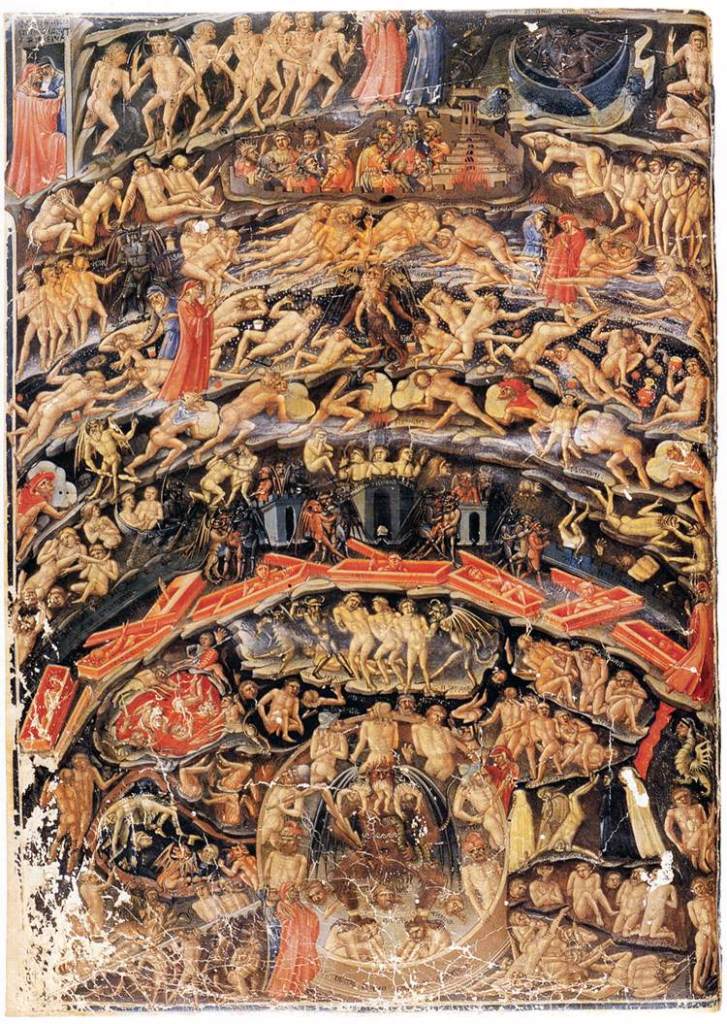Dear Brothers and Sisters in Christ,
 Unless Tammy is travelling with me, I never know whom I’ll be sitting next to when I fly. Most seatmates don’t seem to want much conversation, especially after they ask me, “What do you do?” If I reply, “I’m a pastor,” there is often a polite comment made as they put on their headphones and/or open a book to read. If I say “I supervise missionary work,” a bit more conversation ensues. On a recent flight, after the initial courteous exchanges, my seatmate paused, then asked, “How big do you think hell is?”
Unless Tammy is travelling with me, I never know whom I’ll be sitting next to when I fly. Most seatmates don’t seem to want much conversation, especially after they ask me, “What do you do?” If I reply, “I’m a pastor,” there is often a polite comment made as they put on their headphones and/or open a book to read. If I say “I supervise missionary work,” a bit more conversation ensues. On a recent flight, after the initial courteous exchanges, my seatmate paused, then asked, “How big do you think hell is?”
As we talked, it became clear that he was wondering how many people are now in hell and will go there. Will hell be larger than we imagine and heaven smaller? It’s interesting he didn’t ask about my definition of hell, or what the Bible says about hell. He just wanted to know how big it is.
I joked with him and asked if he was familiar with the pictures of Dante’s Inferno. He said no, and I said, “Well, he makes it look as though hell is already full.” I went on to explain that this topic seems to suffer from more misinformation circulating about hell than is realized.

Most are surprised to learn that the early church did not dogmatize the topic of hell, nor was there a singular view of the subject. In fact, hell is not mentioned in either the Apostle’s Creed or the Nicene Creed. Perhaps this was because the early church fathers realized humans aren’t qualified to judge such matters of eternal consequence—only Jesus Christ is (a good realization, indeed!) .
If we take Jesus seriously when he teaches about mercy, we should also take him seriously when he teaches about punishment. After all, mercy only has meaning if we are escaping a real punishment. Jesus used a variety of word-pictures for the punishment of those who refuse the loving mercy of God: fire, darkness, pain and destruction. Jesus is describing the result of a life of perpetual resistance to God’s love. Whatever hell is, it is a state of alienation from God for those who refuse his unconditional love, grace and mercy. However, this does not mean that God is the one who dispenses the pain and anguish. It is not the equivalent of parents who spank or abuse their children.
Tragically, the all-too-common misperception of God dispensing pain arises from a faulty view of God’s nature. It ignores the eternal relationship between the Father, Son and Spirit, which is lived out in the life of Jesus. It misses the point of God’s kind of humility, which is expressed in mutual self-deference to the other. We should always bear in mind that Jesus said he came to reveal the Father (Matthew 11:27; John 17:25-26). And the Holy Spirit was sent to reveal Jesus’ mission (Hebrews 10:15-16). Jesus taught that when the Spirit comes, he’ll not bear witness to himself but to Jesus (John 15:26). We see that mutual, reciprocal love in Jesus’ teaching about his purpose for coming to earth, saying he did not come to condemn the world but to save or rescue it (John 3:17).
Even more tragically, many people view God as if he suffers from manic depression or a multiple personality disorder. They struggle with the idea that on the one side, God is a being of wrath and then on the other he is a God of love. Some go so far as saying the Father has wrath, but Jesus came to bring love. But if Jesus is the “exact representation” of the Father (Hebrews 1:3) we cannot separate the Father’s nature from the Son’s nature or the Son’s nature from the Father’s. The same is true of the Spirit. Rather than seeing God in such an inconsistent and dissected manner, it is vital to realize that wrath and love are two aspects of a single attribute that is the fundamental character of God. Our talk about God is only accurate when based on the reality of Jesus Christ. He came from the Father to reveal the Father. And what we see in his life and ministry, including at the cross, is that God’s love and God’s wrath are not finally separate.
At the cross, God’s love in Christ is patently real, but so is God’s hatred toward sin. It isn’t that God loves the elect and hates the reprobate—rather, he loves us all, but hates the sin in our lives. Therefore we should think of hell in the same framework as we think of heaven by relating both to the love of God in Christ. God tells us to love our enemies and does no less himself. Because he loves us, he must be against whatever is against us—whatever damages us, harms us and ruins our relationships with God and with others. Anything less would not be loving. The sin in us is the object of God’s wrath because we are objects of his love.
At the cross, we see that the wrath of God has been meted out against human sin, guilt and alienation. Sin was literally put to death there. And it is of paramount importance to see that Christ assumed our broken, diseased humanity, turned it back to God and took on himself the judgment against our sin and guilt. As a result, we have been rescued from our sin, while our sin is condemned and sent away. The punishment due sin was (note the past tense) endured on the cross and does not take place in hell.
Systematic theologian Colin Gunton uses an interesting analogy to understand the love of God on the cross. He equates it to the cosmos suffering from cancer and Jesus taking all of that cancer into his being to heal it. His point is this: at the cross we see both God’s judgment against evil and God’s love for sinners. Since God loves sinners, our understanding of hell must account for both the judgment and the love of God that takes place at the cross.
A person who rejects God’s love is not going to enjoy heaven, and God is not going to force them to be part of the heavenly celebration. Even if he did, they would not enjoy it or experience its benefits. Instead, he permits those who repudiate his mercy to follow their own direction—one decisively shaped by their rejection of God’s love and their perpetual choosing of evil. They cannot see love and mercy as a good choice since they insist on having their own way, saving their pride, no matter what the consequences. Hell is therefore created by those who eternally resist God’s love—it is for those who will not and thus cannot be in the presence of God’s holy love. C.S. Lewis describes this understanding well in his novella, The Great Divorce:
There are only two kinds of people in the end: those who say to God, “Thy will be done,” and those to whom God says, in the end, “Thy will be done.” All that are in hell, choose to be there. Without that self-choice there could be no hell. No soul that seriously and constantly desires joy will ever miss it. Those who seek find. Those who knock it is opened.
When we talk about the glories of heaven compared to the agonies of hell, we should bear in mind that we really cannot conceive the reality of either. It is, to paraphrase the apostle Paul, what no eye has seen, what no ear has heard and what no mind has conceived. The best way to contrast heaven and hell is the way C.S. Lewis described it:
And yet all loneliness, angers, hatreds, envies, and itchings that it [hell] contains, if rolled into one single experience and put into the scale against the least moment of the joy that is felt by the least in heaven, would have no weight that could be registered at all. Bad cannot succeed even in being bad as truly as good is good.
We’ve all experienced loneliness in feeling separate from God and we’ve all experienced joy in understand that we are loved, forgiven, adopted and included by God in the love and life shared by the Father, Son and Spirit. One simply cannot compare one experience with the other.
Here is a final thought to bear in mind when we think of hell as the culmination of judgment: Not only should we see that hell is related to the love of God, but that heaven is also part of the judgment of God. Those who turn to Christ are overjoyed and overwhelmed in realizing that Jesus is the real Judge, a judge who died for the people he judges. “The Father judges no one,” said Jesus, “but has entrusted all judgment to the Son” (John 5:22). Jesus, our Judge, has paid the penalty for the sin of all. Being in heaven means being in fellowship and communion with the Judge who saves by means of his judgment.
The one who judges the righteous, the unevangelized and the wicked, is the one who gave his life so that others might live eternally. Jesus Christ already has taken the judgment of sin and sinfulness upon himself. Therefore judgment should signal a time of joy for everyone, as it will usher in the glory of the everlasting kingdom of God where evil is banished forever and nothing but goodness will exist throughout eternity. Those who want to live with Christ in that goodness will be able to; those who do not want to will not be forced to.
Our hope is in God who sent his Son who ministered to the cosmos through the Spirit to make hell a smaller, rather than a larger place. The real answer to my seatmate’s question is this: Only God knows how big hell will be. And he has done everything he can to make it as small as possible. Given who God is in Jesus Christ, there is no good reason for anyone to go to hell—only the foolish “reason” of repudiating God’s love and forgiveness in order to keep one’s pride.
Trusting Jesus,
Joseph Tkach









